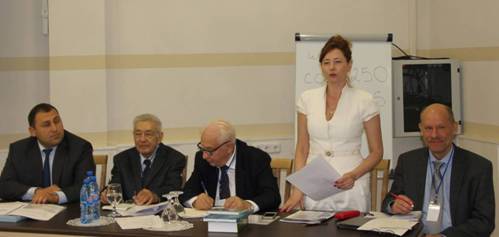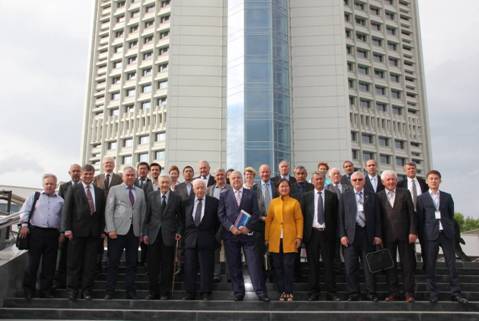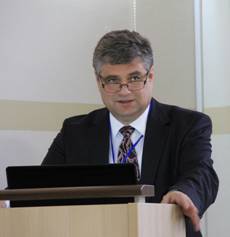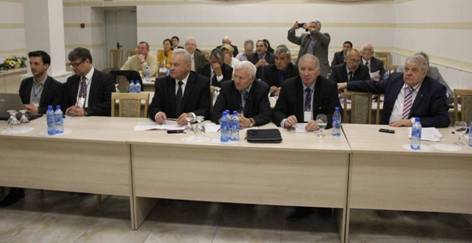Conference was organized by OJSC "Vodstroy" (Russia), the Scientific Information Center of ICWC (Uzbekistan), the Research Institute of Land Reclamation of the National Academy of Sciences of Belarus. The conference was supported by UNECE and GWP CACENA.
The conference addressed the following issues:
- Report on INBO-EECCA activity for 2014;
- Increasing water shortage as a challenge to water security: natural - climate change; anthropogenic - the growth of consumption, the future development, including hydropower;
- Implementing of high technologies in all types of water use (automation, water conservation, energy efficiency, etc.);
- Water accounting and improving of water service quality.
Opening remarks were made by INBO-EECCA President Academician Polad-Zade P.A. The conference featured more than 20 speakers.
The report of the INBO-EECCA Executive Secretary Prof. Dukhovny V.A. highlighted the following issues that the water sector in EECCA countries is facing today:
- Water should be the basis of global security.
- There is a worsening of water shortages in arid zones and increase of water availability in areas with abundant moisture.
- Territorial uneven distribution of water resources.
- Poor control of water resources.
- Strengthening of hydroegoism and hydrosolidarity problem.
- Transboundary problems.
- Manmade-technological risks.
- The need to link water, land, climate and nature.
To solve these problems the followings are suggested:
- fight with the "current trends" routine.
- strengthen the Basin Organizations involvement: more and real things can be seen by local organization.
- strengthen the free exchange of information and create an open knowledge bank.
- emphasis on training, knowledge transfer and clear vision of the future (strategy).
- restore the previous capacity of water facilities design and irrigated areas, which were degraded during last 20 years.
A key presentation on water saving issues was made by GWP CACENA Regional Coordinator Sokolov V.I. He said that in recent decades mankind has realized growth of global problems associated with the water resources use intensification. Because of population growth and economic development the mankind faces the growing shortage of fresh water resources. This global phenomenon is still burdened by climate change. The growing scarcity of water resources, suitable for all kinds of needs of society and the nature, is everywhere, but in certain regions of the world, this process is very intense. The report considered measures on water conservation in irrigated agriculture in Central Asia, changes associated with the process of restructuring agriculture and water management. It was stressed that water conservation is not only a technological process, but largely the institutional one, inextricably linked with the further spread of the IWRM principles. It was noted that the leader in the IWRM implementation in the EECCA region is Uzbekistan. In the Fergana Valley, IWRM is implemented on the area of over 130 thousand hectares and in the Zarafshan river basin and other regions of the country - even on the area of 550 thousand hectares.
Among EECCA countries, Kazakhstan has the lowest water supply. In order to ensure water security in Kazakhstan and to overcome the geopolitical, international, social and economic problems, but also due to increasing water scarcity the river flow reallocation is planned, in particular, the runoff transfer. The flow transfer of Ertis river by the "Astana" canal will become the second independent source of water supply to the capital. Further development of irrigated agriculture in the southern regions of the Republic in the short term is possible only on the basis of implementing the water-saving irrigation technologies, the main of them - drip irrigation system. Today in the South Kazakhstan region the drip irrigation system is implemented on the area of 34.0 thousand hectares.
In Tajikistan, taking into account the soil and lay of land, where there are a variety of natural-economic zones, the techniques and irrigation technology is suggested.
In contrast to the countries of Central Asia, Russia has no problems with quantity of water resources. However, the role of water resources in changing the structure of production and population in Russia needs to be studied on the basis of systemic, large-scale, multidisciplinary scientific research without delay to the deadline when the water crisis turn from of the projected into real. As a result of the conference the resolution was adopted by participants.

High level panel of the conference: from left Mr. Kerimov, Deputy Head of Water Agency of Russian Federation, Mr. Polad-zade, President of INBO-EECCA, Prof. Dukhovny, Executive Secretary of the INBO-EECCA, Mrs. Dunaevskaya, Director of Institute Belarusgiprovodkhoz, Bo Libert, UNECE

Group photo of the INBO-EECCA conference participants in Minsk

